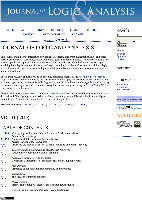
Journal of Logic and Analysis
Scope & Guideline
Exploring the Depths of Mathematical Thought
Introduction
Aims and Scopes
- Nonstandard Analysis:
The journal prominently features research on nonstandard analysis, exploring its implications for various mathematical frameworks, including multi-level approaches and connections to foundational axioms. - Logic and Computability:
A core focus is placed on the interplay between logic and computability, including studies on effective infinitesimals, recursive inequalities, and the complexity of algorithms in analysis. - Algebra and Topology:
Research on algebraic structures, particularly in relation to topological spaces and group theory, is prevalent. This includes topics like Polish topologies and definable sets in continuous logic. - Entropy and Information Theory:
The journal also delves into entropy, especially in the context of types in tracial W*-algebras, highlighting the significance of information theory in logical and analytical contexts. - Advanced Theorems in Analysis:
Papers discussing advanced theorems, such as the Peano and Osgood theorems, reflect the journal's commitment to addressing classical results through modern lenses.
Trending and Emerging
- Multi-level Nonstandard Analysis:
There is a growing interest in multi-level nonstandard analysis, particularly its theoretical implications and applications in foundational mathematics, indicating a trend towards deeper explorations of nonstandard frameworks. - Effective Methods in Logic:
Research focusing on effective methods, including effective completeness and definable functions, is on the rise, reflecting a broader interest in computability and algorithmic approaches to logical problems. - Entropy in Mathematical Structures:
The increasing examination of entropy, especially within tracial W*-algebras and related structures, suggests a burgeoning interest in the informational aspects of mathematics, linking analysis with modern data theory. - Fractal Geometry and Logic:
Emerging studies on fractals and their connections to logical theories indicate a trend towards interdisciplinary approaches, blending geometry with logical analysis in innovative ways. - Complexity in Algorithms:
Research addressing the complexity of algorithms, such as the Analyst's Traveling Salesman problem, shows a significant trend towards investigating computational efficiency within analytical frameworks.
Declining or Waning
- Classical Theorems in Isolation:
Papers that focus solely on classical theorems without new methodological contributions or contemporary applications appear to be less frequent, suggesting a move towards more integrative or innovative approaches. - Intuitionistic Logic:
The exploration of intuitionistic logic, while still present, has diminished, possibly as researchers gravitate towards other logical frameworks that offer broader applicability in current mathematical discourse. - Traditional Set Theory:
Research centered around traditional set theory concepts appears to be waning, as the journal pivots towards more complex and interrelated topics that engage with modern computational and analytical techniques.
Similar Journals
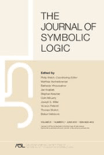
JOURNAL OF SYMBOLIC LOGIC
Illuminating the Depths of Logical InquiryThe JOURNAL OF SYMBOLIC LOGIC, published by Cambridge University Press, stands as a leading platform for scholarly discourse in the realms of logic and philosophy. With a rich history dating back to 1938, this esteemed journal is dedicated to presenting cutting-edge research that pushes the boundaries of knowledge within symbolic logic and its applications. In 2023, it proudly holds a distinguished Q1 ranking in both Logic and Philosophy categories, reflecting its high impact and relevance in the academic community. Researchers and academics benefit from its rigorous peer-review process and contributions from leading scholars worldwide, ensuring the dissemination of high-quality research and critical theories. While the journal currently does not operate under an open access model, it remains a pivotal resource for professionals seeking to deepen their understanding of logical theories and philosophical inquiries. Explore the JOURNAL OF SYMBOLIC LOGIC to engage with scholarly articles that challenge conventional thought and inspire future research.

Australasian Journal of Logic
Illuminating contemporary issues in logical theory.The Australasian Journal of Logic is a prominent scholarly publication in the field of logic, published by the Australasian Association for Logic. With an ISSN of 1448-5052, this journal serves as a vital platform for disseminating research that advances the understanding and application of logical theory and its intersection with various disciplines. Although it is not open access, its rigorously peer-reviewed articles cater to academics, researchers, and students keen on exploring contemporary issues in logic both in theoretical and practical domains. The journal aims to foster scholarly communication and collaboration within the logic community, encouraging the exchange of ideas and insights that shape the future of logical studies. By contributing to the growing body of knowledge in this essential field, the Australasian Journal of Logic plays a crucial role in enhancing the intellectual landscape of logic research.

JOURNAL OF LOGIC AND COMPUTATION
Charting New Territories in Logic and ComputationJOURNAL OF LOGIC AND COMPUTATION, published by Oxford University Press, is a leading peer-reviewed journal dedicated to advancing research in the intersections of logic, computation, and theoretical frameworks of computer science. With an ISSN of 0955-792X and an E-ISSN of 1465-363X, the journal has established itself within academic circles, boasting significant impact evidenced by its category quartiles, including a Q1 ranking in Arts and Humanities (miscellaneous) and a Q2 in Logic for 2023. This prestigious journal emphasizes interdisciplinary approaches to understanding computational systems, hence targeting a diverse audience of researchers, professionals, and students keen on exploring provocative questions in logic and computation. Although not open access, the content is highly valuable, reflecting contemporary challenges and advancements in the field. With over three decades of published work, spanning from 1990 to 2024, the journal continues to contribute richly to the discourse surrounding logical methodologies and computational innovations, making it an essential resource for those engaged in these dynamic areas of study.
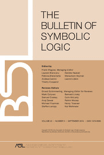
BULLETIN OF SYMBOLIC LOGIC
Unraveling the Mysteries of Logic and ReasoningBULLETIN OF SYMBOLIC LOGIC, published by Cambridge University Press, is a distinguished academic journal that serves as an essential platform for the dissemination of research in the realms of logic and philosophy. Since its inception in 1995, this journal has progressed through its convergence years and remains committed to fostering intellectual discourse among scholars. With a 2023 ranking in the Q1 category of Philosophy and a Q3 classification in Logic, it continues to uphold its reputation as a significant contributor to the field. While operating under a traditional subscription model, the journal dedicates itself to publishing high-quality articles that explore foundational issues, advanced theories, and innovative insights in symbolic logic. Researchers, professionals, and students will find invaluable resources within its pages, particularly as it ranks favorably among peers, with noteworthy standings in Scopus rankings. For those seeking to deepen their understanding of logical frameworks and their philosophical implications, BULLETIN OF SYMBOLIC LOGIC is an indispensable resource.

Reports on Mathematical Logic
Bridging Theory and Practice in Mathematical LogicReports on Mathematical Logic is an esteemed academic journal published by Jagiellonian University’s Theoretical Computer Science Department in Poland. Focusing on the interdisciplinary realms of logic and philosophy, this journal publishes rigorous research articles that explore the foundational aspects and implications of mathematical logic in various contexts. Although it currently maintains an open access model, the journal's impact can be seen through its categorized rankings, with a Q4 in Logic and a commendable Q2 in Philosophy as of 2023. This positions it as a valuable resource for academics seeking to engage with innovative ideas and methodologies in the field. Additionally, the journal has a historical academic presence, having converged in its publication years from 2011 to 2014 and again from 2016 to 2023, underscoring its ongoing commitment to advancing knowledge in logic. With a focus on contemporary research, Reports on Mathematical Logic is essential for researchers, professionals, and students aiming to stay at the forefront of logic studies.
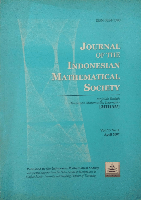
Journal of the Indonesian Mathematical Society
Elevating Mathematical Discourse for a Global Audience.Journal of the Indonesian Mathematical Society is an esteemed platform that serves as a vital conduit for the dissemination of research in various domains of mathematics. Published by the Indonesian Mathematical Society, this journal prioritizes fostering mathematical knowledge and innovation among scholars both regionally and globally. While it currently holds a Q4 ranking in the field of Mathematics (miscellaneous) and ranks within the lower percentile on Scopus, it actively encourages contributions from mathematicians that push the boundaries of current research trends. The journal, accessible at imsi.org/journal, emphasizes open access to ensure that findings reach a wider audience, thereby enhancing their impact. Located in Bandung, Indonesia, and set to converge its publication years from 2019 to 2024, it stands as an important venue for researchers, professionals, and students engaged in mathematical inquiry and advancement.
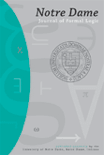
Notre Dame Journal of Formal Logic
Fostering Critical Engagement in the Logic CommunityNotre Dame Journal of Formal Logic is a premier academic publication dedicated to the advancement of research in the field of logical studies. Published by DUKE UNIVERSITY PRESS, this journal has been a significant contributor to the discipline since its inception in 1960, with an impressive convergence of scholarly articles expected to continue through 2024. With its focus on rigorous formal logic, the journal plays a crucial role in fostering discussions that bridge mathematics and philosophical inquiry, holding a notable Q2 ranking in the 2023 Logic category. Despite its non-open-access status, the journal reaches a wide audience of researchers, professionals, and students committed to exploring the foundational aspects of logics. Located in Durham, NC, it provides a platform for innovative thought and critical engagement within the logic community. With its impactful contributions, the Notre Dame Journal of Formal Logic stands as a vital resource for those seeking to deepen their understanding of both classic and contemporary logical theories.
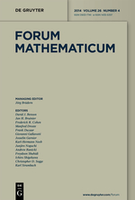
FORUM MATHEMATICUM
Fostering Knowledge: Your Gateway to Mathematical MasteryFORUM MATHEMATICUM, published by WALTER DE GRUYTER GMBH, is a distinguished academic journal based in Germany, known for its significant contributions to the field of mathematics. With an ISSN of 0933-7741 and an E-ISSN of 1435-5337, the journal features comprehensive studies ranging from applied mathematics to diverse mathematical disciplines. Having maintained a commendable presence since 1989, FORUM MATHEMATICUM has achieved notable classification rankings, including Q2 in Applied Mathematics and Q1 in miscellaneous Mathematics as of 2023. Additionally, it holds a Scopus rank within the top 60th percentile in General Mathematics, making it a prominent platform for researchers and professionals seeking rigorous analysis and innovative methodologies in mathematics. While the journal does not currently offer open access, its rich content is pivotal for advancing mathematical theory and applications, appealing to students and seasoned academics alike.
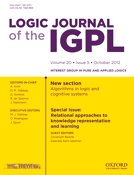
LOGIC JOURNAL OF THE IGPL
Uncovering Insights at the Intersection of Logic and PhilosophyLOGIC JOURNAL OF THE IGPL, published by Oxford University Press, stands as a prominent outlet for scholarly work in the field of logic and philosophy. With its ISSN 1367-0751 and E-ISSN 1368-9894, this journal has been a pivotal platform since its inception, covering critical developments in logical theory, methodology, and applications as well as fostering interdisciplinary dialogue with philosophical inquiries. The journal's impressive ranking in the 2023 Scopus metrics, placing it in the 76th percentile for Mathematics - Logic and categorized in Q2 in Philosophy, underscores its significant impact and relevance. Researchers, professionals, and students alike will benefit from its rich repository of innovative ideas and perspectives, with access options that afford a greater reach to the academic community as well as a commitment to advancing the field until 2024 and beyond. Whether you're exploring the nuances of formal systems or the implications of logic in philosophical contexts, the LOGIC JOURNAL OF THE IGPL offers essential insights that contribute to the ongoing discourse.

Journal of Logic Language and Information
Bridging Disciplines: Where Logic Meets LanguageThe Journal of Logic Language and Information, published by SPRINGER, stands as a leading interdisciplinary platform dedicated to the exploration of the interconnections between logic, language, and information theory. With a history spanning from 1992 to 2024, this esteemed journal provides a vital forum for researchers, professionals, and students in fields such as Computer Science, Linguistics, and Philosophy. Notably recognized in the 2023 rankings, it holds a Q2 quartile in Computer Science (miscellaneous) and Q1 quartiles in both Linguistics and Language, and Philosophy, reflecting its high academic quality and relevance. Despite its nuanced focus, the journal's diverse scope attracts a global readership, encouraging innovative research and critical discourse. Although it is not an Open Access publication, the Journal's valuable contributions can be accessed through various institutional subscriptions, ensuring that its scholarly output remains influential within the academic community.